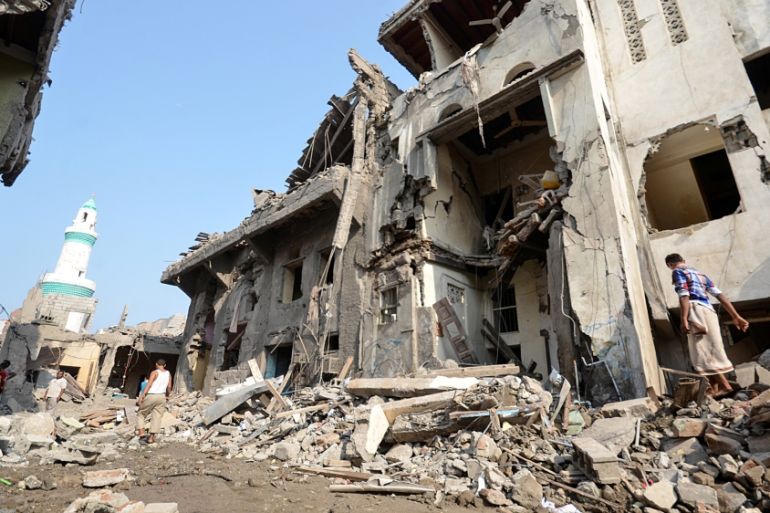Trump vetoes bill to end US involvement in Yemen war
Congress had earlier voted to invoke the War Powers Resolution to try and stop US involvement in a foreign conflict.

President Donald Trump has vetoed a bill Congress passed to end United States military assistance in the Saudi Arabia-led war in Yemen.
In a break with the president, Congress voted for the first time to invoke the War Powers Resolution to try and stop US involvement in a foreign conflict.
Keep reading
list of 4 itemsWho benefits from US tariffs on Chinese imports? Experts weigh in
‘Any time, any place’: Biden and Trump agree to June and September debates
Biden slaps new tariffs on Chinese imports, ratcheting trade war
But Trump vetoed the measure on Wednesday with the Congress lacking the votes to override him.
“This resolution is an unnecessary, dangerous attempt to weaken my constitutional authorities, endangering the lives of American citizens and brave service members, both today and in the future,” said Trump in a statement.
|
|
House approval of the resolution came earlier this month on a 247-175 vote. The Senate vote last month was 54-46.
Al Jazeera’s Rosiland Jordan, reporting from Washington DC, said at least two Democratic congressmen were calling to override the veto.
“Members of the Congress are also angry that the Trump administration is continuing with the pattern of never-ending war around the world without getting the express permission of the Congress first.
“The question now, can the Congress figure out how to reverse the veto and have this resolution take effect in a couple of weeks’ time,” she said.
![Saudi-UAE coalition have launched more than 19,000 air raids across Yemen [File: Mohamed al-Sayaghi/Reuters]](/wp-content/uploads/2019/04/3caa53e206fd4cb383f2293ddbcb366b_18.jpeg)
The UAE hails the veto
Congress has grown uneasy with Trump’s close relationship with Saudi Arabia as he tries to further isolate Iran, a regional rival.
Many legislators also criticised the president for not condemning Saudi Arabia for the killing of a Saudi journalist Jamal Khashoggi, who had been critical of the kingdom.
Khashoggi entered the Saudi consulate in Istanbul last October and never came out. Intelligence agencies said Saudi Crown Prince Mohammed bin Salman was complicit in his murder.
Vetoing the measure is an “effective green light for the war strategy that has created the world’s worst humanitarian crisis to continue”, said International Rescue Committee (IRC) president and CEO David Miliband.
“Yemen is at a breaking point with 10 million people on the brink of famine. There are as many as 100 civilian casualties per week, and Yemenis are more likely to be killed at home than in any other structure.”
The US provides billions of dollars of arms to the Saudi-led coalition fighting against Iran-backed rebels in Yemen.
Since 2015, the US has provided the aerial refuelling of jets, reconnaissance, targeting and intelligence information to Saudi Arabia and the United Arab Emirates (UAE), in their campaign against the Houthi rebels who unseated the Saudi-backed government in Yemen.
The UAE has hailed the veto, adding that the decision is both “timely and strategic”.
“President Trump’s assertion of support to the Arab Coalition in Yemen is a positive signal,” Minister of State for Foreign Affairs Anwar Gargash said on Twitter early on Wednesday.
![Aid groups estimate as many as 85,000 children starved to death [File: Hani Mohammed/AP Photo]](/wp-content/uploads/2019/04/40fb25fb217341f1912b95ace9a2a845_18.jpeg)
‘Humanitarian crisis’
Saudi Arabia and a coalition of Arab governments have launched more than 19,000 air raids across Yemen.
“There are 22 million souls at risk of dying, of being killed. Maybe not of being shot, but being starved to death or dying from medical problems for which they can receive no medicines,” House Majority Leader Steny Hoyer previously told reporters.
“It is a humanitarian crisis. I would refer to it in even more draconian terms because I think it’s such a conscious effort by both sides to put these people at risk,” he added. “It is necessary for us to act.”
The fighting in the Arab world’s poorest country also has left millions suffering from food and medical care shortages and has pushed the country to the brink of famine.
Air raids by the Saudi-UAE coalition have hit civilians, hospitals and water treatment facilities. Aid groups estimate as many as 60,000 civilians have been killed in the war and as many as 85,000 children starved to death, with millions more “one step away from famine“.
|
|